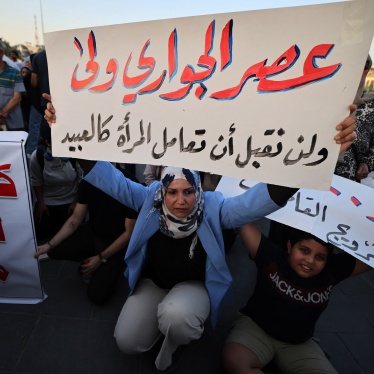Libya’s decision on Wednesday to summarily deport all undocumented foreigners – perhaps more than 1 million people – risks exposing asylum seekers and those in need of protection to persecution and abuse in their own countries, Human Rights Watch said today. Forcible returns violate international law and Libya’s own commitment to protect refugees.
Most of the undocumented foreigners in Libya are there for work or to travel onward to Europe. But Human Rights Watch fears that if Libya carries out its threat, individuals with a legitimate claim for asylum will be returned to their home countries, such as Eritrea, Somalia and Sudan, where repression and armed conflict are ongoing.
“A mass deportation from Libya would put an untold number of people at risk of serious harm,” said Bill Frelick, director of Human Rights Watch’s Refugee Policy Program. “This sweeping policy, with no chance for bona fide asylum seekers to get protection, violates the fundamental principles of refugee law.”
Libya has no law or procedures in place for asylum seekers, but its constitutional law prohibits the extradition of “political refugees.”
The Libyan government claims that none of the more than 1 million undocumented foreigners in Libya are refugees. While many foreigners who entered Libya illegally came in search of a better life, or in the hope of reaching European countries, Human Rights Watch has interviewed refugees and asylum seekers who spent time in the country with legitimate protection claims.
For its 2006 report on foreigners in Libya, “Stemming the Flow,” Human Rights Watch interviewed 56 migrants, asylum seekers and refugees with experience in the country. At the time of the interviews, 17 of the interviewees had received refugee status, either from the United Nations High Commissioner for Human Rights in Libya or from the Italian government. Thirteen others were waiting for the Italian government’s response to their asylum claims.
Some of the interviewees said they would have stayed in Libya rather than risk a dangerous boat trip to Italy if asylum had been an option.
“The government’s refusal to put in place any asylum determination procedures undermines its claim that none of the foreigners are refugees,” Frelick said. “Summarily deporting all foreigners without papers makes it impossible for asylum seekers to exercise their rights.”
Of particular concern are mass returns to Eritrea, where the government has detained and possibly tortured returnees from Libya. In one case, in 2004, Eritreans being forcibly returned from Libya hijacked their plane en route and forced it to land in Sudan, where UNHCR recognized 60 of the deportees as refugees. More Eritrean returns were reported in July 2007, but Human Rights Watch has no information about the treatment of those people upon return.
In recent years, the European Union, and especially southern European countries such as Italy and Malta, have been pressuring Libya to control illegal migration. Just last month, Italy and Libya agreed to conduct joint coastal patrols. Meanwhile, foreign aid has centered on border control and enforcement, with scant attention to protection needs.
“Europe is fixated on blocking people from getting to its borders, without adequate regard for these people’s protection needs,” Frelick said.
Human Rights Watch also expressed concern about the risk that Libyan security forces and police may abuse undocumented foreigners during arrests and detentions before deportation. Human Rights Watch’s 2006 report documented serious violations against foreigners during arrests and in detention, including beatings, overcrowding, sub-standard conditions, not having access to a lawyer, and having limited information about pending deportation.
The government reportedly said that authorities would destroy makeshift homes and shelters where undocumented immigrants live on the outskirts of Tripoli and other cities.
According to Libya’s Constitutional Proclamation from 1969, “the extradition of political refugees is prohibited.” Law 20 of 1991, “On Enhancing Freedom,” says Libya “supports the oppressed and the defenders on the road to freedom and they should not abandon the refugees and their protection.”
The Constitutional Proclamation and Law 20 are two of four fundamental laws in Libya that assume constitutional weight.
Libya has signed neither the 1951 Geneva Convention on the protection of refugees nor its 1967 Protocol, but both the Convention against Torture and the African Refugee Convention forbid Libya from sending individuals to countries where they face a serious risk of persecution or torture.
Under customary international law, Libya is also obliged not to return any person to a place where they may face persecution, or where their life or freedom is at risk. In order to ensure compliance with these obligations, Libya must allow migrants to lodge asylum claims and identify any refugees or persons otherwise in need of international protection.








